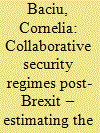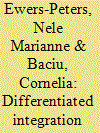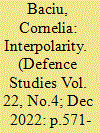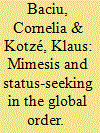|
|
|
Sort Order |
|
|
|
Items / Page
|
|
|
|
|
|
|
| Srl | Item |
| 1 |
ID:
175701


|
|
|
|
|
| Summary/Abstract |
Drawing on theories of international regimes and game theoretical approaches this article analyzes the level of overlap in national security strategies, seeking to explore the potential of convergence in security and defense cooperation in Europe post Brexit. It investigates two research questions: 1. What is the potential for future security cooperation in the Euro-Atlantic space post-Brexit? and 2. What areas are more prone to collaboration? The paper applies cluster analysis and a comparative design, using national security strategies as units of study. It finds that there is potential for future convergence between EU27 and the UK at the industrial level, in internal security matters and EU missions.
|
|
|
|
|
|
|
|
|
|
|
|
|
|
|
|
| 2 |
ID:
187306


|
|
|
|
|
| Summary/Abstract |
An extensive size of literature has investigated the multifaceted dimensions of differentiated integration in Europe. Notwithstanding, we know little about the drivers and strategic underpinnings of differentiated integration in the high politics areas concerning national and international security, such as foreign policy, security and defence. What explains the variation in states’ foreign policy preferences of integration in multilateral security orders? In this article, we seek to explain this variation by putting forward a two-level argument. First, we claim that states adopt a genuine role player conception underpinned by a mixture of relative gains, absolute gains, and normative factors. Second, we propose a novel operational model to examine member states’ efforts for cooperation and integration in the security and defence domain based on their threat perceptions, level of ambitions, strategic partnerships, military spending, and troop deployments. To illustrate our argument, we employ a comparative case study design, examining four countries: Germany, France, Ireland and Romania. The article finds that the analysed countries play conspicuous roles in the Euro-Atlantic security order. France takes the role of an agile power-projector, Germany embraces the role of a global responsibility taker, Ireland plays the role of a peacekeeping neutral, and Romania of a small regional power.
|
|
|
|
|
|
|
|
|
|
|
|
|
|
|
|
| 3 |
ID:
187301


|
|
|
|
|
| Summary/Abstract |
This Introduction to Special Issue (SI) seeks to provide a corrective dimension to unipolar and multipolar understandings of global order by proposing to integrate several levels of analysis. It seeks to introduce a different understanding of the contemporary world order. To this end, it first develops a new theoretical model of world order, putting forward the concept of interpolarity. Interpolarity is understood as the interaction between multiple interdependent poles of different sizes. The main utility of this concept is that it can provide a theoretical foundation for integrating means, ways, and ends in a more stable manner. Second, this Introduction to SI estimates three main conceptual building blocks of an interpolar world order: positive power, citizen reciprocity, and elite bridging. The contributions in this Special Issue examine different aspects of the European security and foreign policy as part of the liberal international order – including the relations with NATO and the US –, EU actorness in cybersecurity governance, French-German cooperation, role conceptions and differentiated integration, as well as the BRICS perspective on world order.
|
|
|
|
|
|
|
|
|
|
|
|
|
|
|
|
| 4 |
ID:
187308


|
|
|
|
|
| Summary/Abstract |
An increasing strand of literature has been studying the dynamics of contestation of the liberal order. Holding that order emergence commences with rhetoric and narratives, this article takes stock of the BRICS summit diplomacy and contestation practices. It pursues a two-level argument. Applying BRICS as a historical case study, the article first reveals how BRICS engages in mimetic performances, re-producing parts of the global order, while simultaneously seeking a re-configuration of the current international system. Second, our analysis shows that through thin and aspiring thick recognition, BRICS countries move toward an enhanced role and status, striving for a better position in the global order. Empirically, to unpack our argument, we analyze BRICS summit diplomacy and rhetoric by unfolding the outcome declarations in the period 2009–2020, as well as BRICS performative practices.
|
|
|
|
|
|
|
|
|
|
|
|
|
|
|
|
|
|
|
|
|